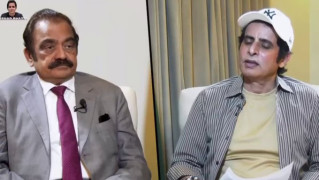
Indeed, one night the Prophet (Sal Allaahu Alaiyhi Wa Sallam) was granted the Night Journey of al-Israa wal Miraaj, when he was first transported from Masjid al-Haraam to Masjid al-Aqsa and then onwards, he ascended to the Heavens and Allaah spoke to him as He willed, and enjoined the five daily prayers upon him.
However, the big question to ask is.
What did the Prophet (Sal Allaahu Alaihi Wassallam) do when the same day arrived the next year? Or the year after that? Or the year after that?
Surely the Prophet (Sal Allaahu Alaihi Wa sallam) did not omit or forget anything in the deen. Surely he did not hide anything from mankind.
The Prophet (Sal Allaahu Alaihi Wa sallam) said, There is nothing that brings you closer to Jannah except that I have informed you about it and there is nothing that brings you closer to the fire of Hell except that I have warned you against it. (at-Tabaraani--Saheeh)
Then why do we not have ANY Saheeh reports of the Prophet (Sal Allaahu Alaihi Wa sallam) or the Sahaabah worshipping Allaah especially on this night and fasting the next day?
BECAUSE THAT WAS NOT THE PRACTICE OF RASUL ALLAAH (Sal Allaahu Alaihi Wa sallam) OR HIS SAHAABAH!
If celebrating this event was something that is prescribed in Islam, the Messenger (Sal Allaahu Alaihi Wa sallam) would certainly have told his ummah about it, either in word or in deed. If any such thing had happened, it would have been well known, and his companions would have transmitted the information to us. They narrated from the Prophet (Sal Allaahu Alaihi Wa sallam) everything that we need to know, and they did not neglect any aspect of the religion, rather they were the first ones to do anything good. If celebrating this night had been prescribed in Islam, they would have been the first people to do so.
And if it wasnt the practice of our Beloved Prophet (Sal Allaahu Alaihi Wa sallam) or his Sahaabah, then, why, O Muslim, do YOU insist on doing it???
Isnt the Prophet (Sal Allaahu Alaihi Wa sallam) the best example to be followed?
لَقَدْ كَانَ لَكُمْ فِي رَسُولِ اللَّهِ أُسْوَةٌ حَسَنَةٌ لِّمَن كَانَ يَرْجُو اللَّهَ وَالْيَوْمَ الْآخِرَ وَذَكَرَ اللَّهَ كَثِيرًا
In the Messenger of Allah you have a fine example for he who hopes for Allah and the Last Day and remembers Allah abundantly. (Surah al-Ahzaab: 21)
But everyone does so!!
Sure, I know, you have seen your fathers and grandfathers doing so. But, let me remind you, O Muslim, that it is NOT our forefathers that we are supposed to follow. Rather, our worship should be based on proofs from the Quraan and authentic Sunnah, and NOT culture or tradition.
وَإِذَا قِيلَ لَهُمُ اتَّبِعُوا مَا أَنزَلَ اللّهُ قَالُواْ بَلْ نَتَّبِعُ مَا أَلْفَيْنَا عَلَيْهِ آبَاءنَا أَوَلَوْ كَانَ آبَاؤُهُمْ لاَ يَعْقِلُونَ شَيْئاً وَلاَ يَهْتَدُونَ
When it is said to them: 'Follow what Allah has sent down,' they reply: 'We will follow that which we found our fathers upon,' even though their fathers did not understand anything nor were they guided. (Surah al-Baqarah: 170)
Now, some of you will say, Whats the harm in it? I am just worshipping Allah!
But, the answer to that, O noble reader, is..
وَمَن يُشَاقِقِ الرَّسُولَ مِن بَعْدِ مَا تَبَيَّنَ لَهُ الْهُدَى وَيَتَّبِعْ غَيْرَ سَبِيلِ الْمُؤْمِنِينَ نُوَلِّهِ مَا تَوَلَّى وَنُصْلِهِ جَهَنَّمَ وَسَاءتْ
مَصِيرًا
"And whosoever opposes the Messenger (Muhammad Sal Allaahu Alaihi Wa sallam) after the right path has been shown clearly to him, and follows other than the believers' way, We shall keep him in the path he has chosen, and burn him in Hell - what an evil destination!" [Surah an-Nisaa:115]
The Prophet (Sal Allaahu Alaihi Wa sallam) said: Whoever introduces anything into this matter of ours that is not part of it will have it rejected. (Bukhaari, Muslim)
Shaykh Ibn Uthaymeen says: Fasting on the twenty-seventh of Rajab and spending that night in prayer is a bidah (innovation), and every bidah is a going astray. (Majmoo Fataawa , 20/440)
So, remember, my dear brothers and sisters in Islaam, DO NOT single out the 27th for your worship because it was NOT the practice of the Prophet OR his Sahaabah. If however, you pray every single night and it is part of your routine to stay up for worship, then there is no harm.
The problem arises when one thinks that this night is special and singles out this night or day for worship, thinking they are getting extra reward for their worship. But this is contrary to the Sunnah.
However, the big question to ask is.
What did the Prophet (Sal Allaahu Alaihi Wassallam) do when the same day arrived the next year? Or the year after that? Or the year after that?
Surely the Prophet (Sal Allaahu Alaihi Wa sallam) did not omit or forget anything in the deen. Surely he did not hide anything from mankind.
The Prophet (Sal Allaahu Alaihi Wa sallam) said, There is nothing that brings you closer to Jannah except that I have informed you about it and there is nothing that brings you closer to the fire of Hell except that I have warned you against it. (at-Tabaraani--Saheeh)
Then why do we not have ANY Saheeh reports of the Prophet (Sal Allaahu Alaihi Wa sallam) or the Sahaabah worshipping Allaah especially on this night and fasting the next day?
BECAUSE THAT WAS NOT THE PRACTICE OF RASUL ALLAAH (Sal Allaahu Alaihi Wa sallam) OR HIS SAHAABAH!
If celebrating this event was something that is prescribed in Islam, the Messenger (Sal Allaahu Alaihi Wa sallam) would certainly have told his ummah about it, either in word or in deed. If any such thing had happened, it would have been well known, and his companions would have transmitted the information to us. They narrated from the Prophet (Sal Allaahu Alaihi Wa sallam) everything that we need to know, and they did not neglect any aspect of the religion, rather they were the first ones to do anything good. If celebrating this night had been prescribed in Islam, they would have been the first people to do so.
And if it wasnt the practice of our Beloved Prophet (Sal Allaahu Alaihi Wa sallam) or his Sahaabah, then, why, O Muslim, do YOU insist on doing it???
Isnt the Prophet (Sal Allaahu Alaihi Wa sallam) the best example to be followed?
لَقَدْ كَانَ لَكُمْ فِي رَسُولِ اللَّهِ أُسْوَةٌ حَسَنَةٌ لِّمَن كَانَ يَرْجُو اللَّهَ وَالْيَوْمَ الْآخِرَ وَذَكَرَ اللَّهَ كَثِيرًا
In the Messenger of Allah you have a fine example for he who hopes for Allah and the Last Day and remembers Allah abundantly. (Surah al-Ahzaab: 21)
But everyone does so!!
Sure, I know, you have seen your fathers and grandfathers doing so. But, let me remind you, O Muslim, that it is NOT our forefathers that we are supposed to follow. Rather, our worship should be based on proofs from the Quraan and authentic Sunnah, and NOT culture or tradition.
وَإِذَا قِيلَ لَهُمُ اتَّبِعُوا مَا أَنزَلَ اللّهُ قَالُواْ بَلْ نَتَّبِعُ مَا أَلْفَيْنَا عَلَيْهِ آبَاءنَا أَوَلَوْ كَانَ آبَاؤُهُمْ لاَ يَعْقِلُونَ شَيْئاً وَلاَ يَهْتَدُونَ
When it is said to them: 'Follow what Allah has sent down,' they reply: 'We will follow that which we found our fathers upon,' even though their fathers did not understand anything nor were they guided. (Surah al-Baqarah: 170)
Now, some of you will say, Whats the harm in it? I am just worshipping Allah!
But, the answer to that, O noble reader, is..
وَمَن يُشَاقِقِ الرَّسُولَ مِن بَعْدِ مَا تَبَيَّنَ لَهُ الْهُدَى وَيَتَّبِعْ غَيْرَ سَبِيلِ الْمُؤْمِنِينَ نُوَلِّهِ مَا تَوَلَّى وَنُصْلِهِ جَهَنَّمَ وَسَاءتْ
مَصِيرًا
"And whosoever opposes the Messenger (Muhammad Sal Allaahu Alaihi Wa sallam) after the right path has been shown clearly to him, and follows other than the believers' way, We shall keep him in the path he has chosen, and burn him in Hell - what an evil destination!" [Surah an-Nisaa:115]
The Prophet (Sal Allaahu Alaihi Wa sallam) said: Whoever introduces anything into this matter of ours that is not part of it will have it rejected. (Bukhaari, Muslim)
Shaykh Ibn Uthaymeen says: Fasting on the twenty-seventh of Rajab and spending that night in prayer is a bidah (innovation), and every bidah is a going astray. (Majmoo Fataawa , 20/440)
So, remember, my dear brothers and sisters in Islaam, DO NOT single out the 27th for your worship because it was NOT the practice of the Prophet OR his Sahaabah. If however, you pray every single night and it is part of your routine to stay up for worship, then there is no harm.
The problem arises when one thinks that this night is special and singles out this night or day for worship, thinking they are getting extra reward for their worship. But this is contrary to the Sunnah.
Last edited by a moderator:



































